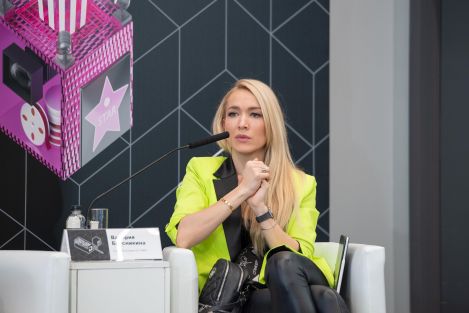
Valeria Brusnikina, manager of the IT projects portfolio of the IPChain Association, answers questions from foreign media
News

22 January 2021
The music market is one of the most structured around from the perspective of intellectual property rights. Sergei Matveev, the president of the Intellectual Property Federation, told «Culture» about how this could help during the pandemic.
— Sergei Yurievich, how did the coronavirus crisis influence the intellectual property field?
Let's separate the concepts. We have to talk separately about the impacts on business itself and the impact on the intellectual property field, since this is an important legal mechanism for both entrepreneurs and creators. I will hold off on talking about business for a while: everyone knows that a significant part of entrepreneurs simply lost their sources of income, from concert activities, film screenings, part of the trade sector, restaurant and tourist business, exhibition business. In Russia, society tends toward in-person consumption of creative products, so the segment has suffered more than in other countries. It's a shame that the government, with a few exceptions, has not been able to adequately respond to this.
— What about legal mechanisms?
First, they provide for the direct or indirect integration of authors and creators of creative products in the sales chain, guaranteeing their income through both contractual and non-contractual management. Naturally, all these revenues have been reset to zero, and recovery is still a long way away. The state itself, as the guarantor of these rights, chose not to notice these chains. The people who were literally hit by the pandemic—musicians, performers, lyricists—were left without support.
Second, trying to instantly move creative products from offline to online wasn't a no-brainer. Just look how many rights violations took place when content was posted on the internet! Only the unity of Russian society in the face of external danger kept us from countless lawsuits and disputes. But the legal system still has questions to answer, both in terms of the mechanisms for the implementation of rights and in terms of the financial issues related to them.
— How was the intellectual property rights field changed by digitalization, or the “digital rights” that were created last year?
The most interesting thing now isn't even "digital rights", but other, less publicized changes. Cvil legislation has explicitly recognized contracts that are concluded digitally. The dry letter of the law say that if a digital recording makes it possible to reproduce the content of a transaction in an unchanged form and if any method can be used to reliably determine the person who expressed that will, then the deal is as good as written. This is the end of the era of "paper contracts." After all, every author, copyright holder and consumer can make these entries in the blockchain, and this technology is the best at ensuring immutability. And if agreeing on the terms of such a contract between the parties can be facilitated by an IT service, you get a real legaltech product (technological solutions for lawyers and legal business). A digital system can also monitor the execution of such a contract. Working with rights becomes accessible and easy. We have entered a new era. I call it the era of digital legal self-service.
— You mentioned blockchain technology. What other advantages does it have?
To date, this is the most convenient technology for working with intellectual property rights. Regarding digital transactions, I have already said that the blockchain guarantees the immutability of the transaction content. But there are also other important points. Change codes can automatically block accidental or intentional violation of rights. If the terms and parameters of license agreements are recorded in a machine-readable form, the blockchain infrastructure can cope with the routine work of their execution, accounting for the volume of use and timely transfer of royalties.
State registration of transactions can also become instantaneous. For example, if you digitally make a transaction with several musical works and a trademark. Now the rights to the music can pass to the buyer immediately, but for the acquisition of the right to use the trademark, the licensee will have to wait: Rospatent must begin the established bureaucratic procedure and register the transfer of rights. In the blockchain, this problem is easily solved: the agency could start the registration procedure using the consensus of the blockchain network (the consent of all participants in the distributed registry with the entry of data). If there are lists of licensees, or "white lists," it is easy to deal with violators by removing illegal content from search results or blocking pirate sites. It turns out that you can easily shift the routine function of preventing violations and protecting rights to a soulless machine and chain codes, leaving the most important work to a person: determining to whom and under what conditions they want to transfer the right to use, and simply expressing their desire using a digital service.
— Will artificial intelligence (AI)) change the intellectual property market?
For me, AI is just an effective learning technology that provides incredible and previously unattainable opportunities for working with information. This kind of technology is extremely important for the field of intellectual property law. Let me remind you: in order to have such a right, you need to create something through creative work. Machine learning and artificial intelligence systems are better than most experts at verifying that you have actually created something and not merely copied it. They are excellent at detecting the "borrowing" that sometimes happens unintentionally.
AI plays an equally important role in object recognition. They help us to say what kind of work we're seeing or listening to—and, of course, who it belongs to. An example is the music service Shazam. The Russian service n'RIS Antipiracy, which analyzes hundreds of sites in minutes and finds illegal copies of films, is excellent at looking for rights violators. I will give an example of the Russian service, "Suede" [Zamsha]: it recognizes and creates a list of musical and literary works that have been broadcast on radio stations and TV channels with the highest possible level of probability. Rospatent recently presented a prototype of a service similar to Shazam, but for the trade and service field: just point your smartphone camera at the facade of a shopping center, and the app will find all the protected trademarks and tell you who they belong to. This is important for combating counterfeiting in the offline world.
— In your opinion, how well are performers’ copyrights and related rights protected?
I think this segment is one of the most structured and comprehensible when working with intellectual property rights in the creative economy. Music is one of the most important creative products; its language is universal, and the market for real music is always global. Today, there are many services for private listening, beginning with Yandex.Music, and going all the way to Sber (no longer a bank) launching "Sbersound." There's iTunes, there's Spotify... For public spaces, from shopping malls to gyms, there is a Fonmix service that provides legitimate soundtracks. It follows the global trends of the platform economy: not so long ago, it took ownership of Melodia, a platform that has access to content rights.
The music market is moving towards digital, automated and individual rights management. In this area, what's left is solving the problem of using ownerless, orphaned works, the author or copyright holder of which is unknown, and to make a "showcase" of works by disinterested authors. This is now an active part of the Ministry of Culture's digital transformation program, and then the whole system will come together like a jigsaw puzzle.
A large role in the digitization process in this area was played by the collective rights management system. Thousands of lawsuits filed by the Russian Copyright Society very quickly helped to form an understanding of the institute of intellectual property rights and the fact that an intangible product has a price.
— There is an opinion that today in Russia, a new legal and technological reality is coming to be in the intellectual rights management field.
Yes, this is objectively true. Of course, not only and not entirely because we're all so smart, but because we do not have the baggage of last century's customs. We do not have enough intermediaries and specialists in the intellectual property field who can solve the problem of authors and business through old ways. Grigory Petrovich Ivliev, head of Rospatent, cites convincing figures that indicate a thousands-strong shortage of specialists.
On the one hand, this is bad, but on the other, it might actually be good. Of course, we need to train specialists, but in my opinion, we won't be able to train them in the numbers that we need. Therefore, our path is different: we need the automation of law and the development of legal "self-service." The solutions that we create within the country are progressive. They are initially based on an understanding of current issues, using such modern technologies like blockchain to secure rights and guarantee the immutability of the content of the contract, along with artificial intelligence to proactively prevent violations of rights, such as by monitoring the airwaves.
— In your opinion, what is the biggest problem in the Russian intellectual property field?
Even three or four years ago, I would have said that the main problem is a lack of respect for creative work. Then you would often see situations where a person took and used someone else's product, whether or not they had the right. This was evident through the amount of online piracy and the number counterfeit products. But this era is over: society has learned to understand and appreciate creativity and products created by talent.
Today, the main problem is the functional haphazardness and isolation of government institutions from reality: both "in-person" reality and digital. According to international indexes of the systematic interaction of public and private mechanisms for rights protection, we fall below 40th place. Our entire system of state guarantees and intellectual property rights is based in the material, resource-based world. As a result, we have not yet managed to create an institutional environment, either in terms of investment or taxation, for the development of new forms of the same creative economy. But I'm sure it will work. There is simply no other way out.